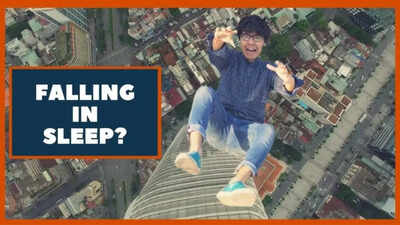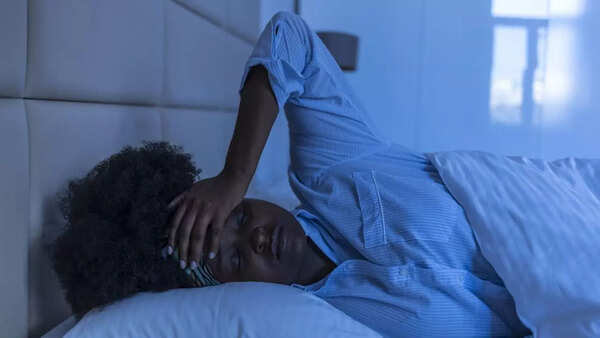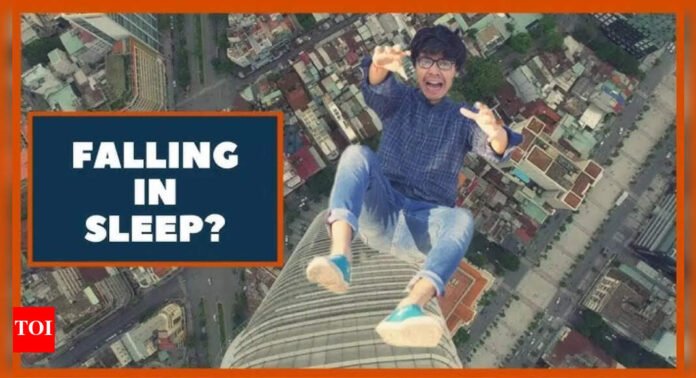Understanding Hypnic Jerks: Simple Guide to Causes and Prevention
Ever felt like you’re falling just as you’re about to sleep? This is called a hypnic jerk. It’s a sudden muscle twitch that can startle you awake.

These jerks can happen due to stress, some medicines, or lifestyle habits. About 70% of adults experience them. They’re usually harmless but can affect your sleep. When it happens, you might dream you’re falling. You wake up before you hit the ground, often feeling sweaty and shaky.
What is a Hypnic Jerk?
A hypnic jerk is a sudden, strong muscle twitch as you fall asleep. It usually happens in the first stages of sleep. These jerks, or “sleep starts,” can affect your whole body or just parts like your arms or legs. They’re uncontrollable and happen without you meaning to move.

What Does a Hypnic Jerk Feel Like?
When you have a hypnic jerk, you might feel or experience:
- A sudden body sensation
- Seeing a bright light
- Hearing a loud sound
- Remembering a dream right as you wake up
- Your heart beating faster
- Breathing quickly and sweating
- Feeling shocked or startled
What Causes Hypnic Jerks?
Stimulants
Caffeine and nicotine, especially close to bedtime, can mess up your sleep. This makes hypnic jerks more likely. Drinking coffee to stay awake when you’re tired might help short-term. But it can hurt your sleep in the long run.
Medications
Some medicines for depression, anxiety, and other mental health issues can make hypnic jerks worse. If you think your medicine is causing this, talk to your doctor.
Stress
Mental or physical stress can increase hypnic jerks. This includes anxiety, depression, tough workouts, hard jobs, and not getting enough sleep.
How to Prevent Hypnic Jerks
Here are some tips to help stop hypnic jerks:
- Sleep enough: Try to get 8 hours of sleep each night.
- Keep a schedule: Go to bed and wake up at the same time every day, even on weekends.
- Relax before bed: Avoid screens 30 minutes before bed. Try calming activities like reading or puzzles.
- Make your bedroom sleep-friendly: Keep it quiet, cool, and dark.
- Eat and drink smart: Have smaller meals before bed and avoid alcohol.
- Have a bedtime routine: Do calming activities to tell your brain it’s time to sleep.
- Use your bed for sleep only: Avoid doing other activities in bed. Only go to bed when you’re tired.
Hypnic Jerks in Babies
Anyone can have hypnic jerks, no matter their age. Adults often report them more, but babies can have them too. Studies show that these sudden muscle movements are a normal part of how our nervous system develops. They can even happen before a baby is born.
Are Hypnic Jerks Dangerous?
Most of the time, hypnic jerks are harmless. But if they happen a lot, mess up your sleep, or come with other worrying signs, it’s a good idea to see a doctor. They might be a sign of a sleep problem or other health issue that needs attention.
When to See a Doctor
Think about seeing a doctor if hypnic jerks often disrupt your sleep. Once diagnosed, your doctor will help you find ways to reduce them. This might include changing medicines, improving sleep habits, or managing stress. They’ll also check for other conditions that can cause similar symptoms, like:
- Restless Legs Syndrome (RLS): A disorder that makes you feel like you have to move your legs, often with uncomfortable sensations.
- Myoclonic epilepsy: A seizure disorder that causes sudden, brief muscle spasms.
- Periodic Limb Movement Disorder (PLMD): A condition that causes repetitive leg cramping, twitching, or jerking during sleep.



